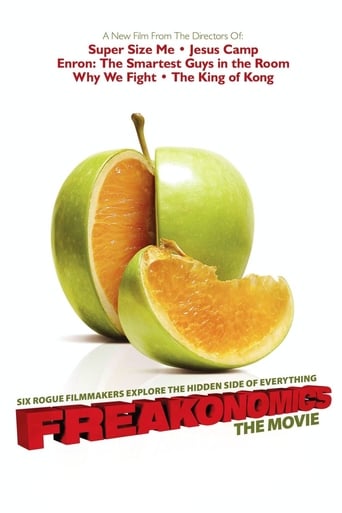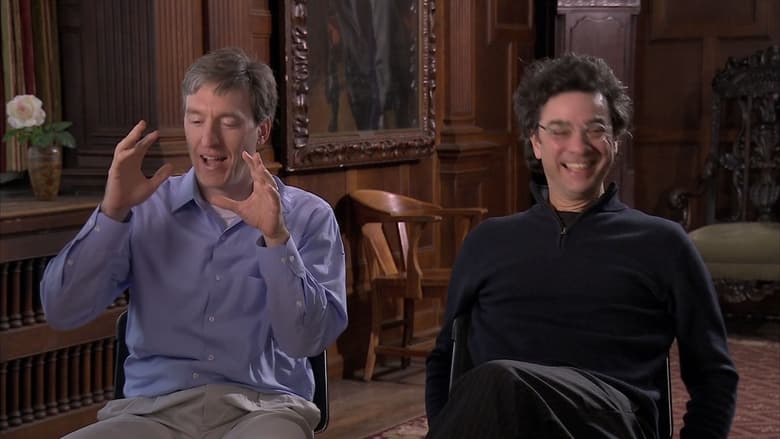

Freakonomics (2010)
Some of the world's most innovative documentary filmmakers will explore the hidden side of everything.
Watch Trailer
Cast


Similar titles
Reviews
This isn't really a documentary. A few of the chapters from the book are presented in this film. The way the issues are presented usually involve first Levitt and Dubner speaking about the issue interspersed with various imagery and animation. Some archival footage is used. Particularly when the topic addresses famous historical events. Each segment will also have actors re-enacting events or acting out original scenes to present the topic visually. There are also other experts or people who call themselves experts (like an "expert" in baby names) talking about the issue. Finally there is some footage of actual people either discussing personal experiences, or in the case of the high school students, the students themselves living their lives. Although even this seems staged at points. It seems they used a lot of flashy graphics and various forms of presentation to cover up the fact that this film is ultimately Levitt, Dubner and the narrator just talking generally about the issues covered in the book. I'm a fan of the podcast so if this film had just been them talking and nothing else I'd still have liked it. But there is a sense of lacking an opportunity in creating something new on film. All the colorful imagery doesn't bring anything new to the table. The film doesn't cover the entire book. I haven't read it in years but one of the more important topics to me was about the drug dealers which wasn't in the film. What I found really lacking, beyond the visual or the missing chapters, is that they didn't really go into detail with anything. They vaguely reference statistics, but hardly show any. They make off handed comments about important concepts that they don't spend any time on. Two of the most important themes of the entire work, causation vs. causality, and the power of incentive are hardly discussed beyond the immediate topic. For example while they note in the film that people often mistake correlation with causation, and that finding cause is very difficult, they don't spend a second actually explaining why cause is difficult to ascertain (except that it isn't immediately apparent). Day one of a social science course is going to identify the difficulty or impossibility of defining cause. Levitt and Dubner do not mention that while statistics and economics in the scope of numbers is natural science, their application in Freakonomics is social science, and all the stats in the world won't necessarily prove cause in social science.
Until 2005, the words 'economics' and 'fun' were unlikely to be found in the same sentence. Economics was seen as a dry, technical, mathematical discipline: the preserve of driven businessmen, greedy bankers and staid Treasury officials. Fun was its opposite: spontaneous enjoyment available to regular people.The publication of Freakonomics in 2005 changed all that. Steven Levitt, a professor of economics at the University of Chicago, and Stephen Dubner, a New York Times journalist, somehow gave economics popular appeal. So far the book has sold over four million copies worldwide. Last year, a sequel, Superfreakonomics, was published and there is also a Freakonomics blog linked to the New York Times website.Wherever there's an unexpected publishing hit, you can be sure that a bandwagon will soon follow. In 2007 alone we had Steven Landsburg's More Sex is Safer Sex, Tyler Cowen's Discover Your Inner Economist and Diane Coyle's The Soulful Science. Nor is the fun confined to the paperback stands. Earlier this month there was even an international academic symposium on 'economics made fun in the face of economic crisis' at Erasmus University in Rotterdam.The film follows the structure of the book with chapters loosely linked by the broad approach of the authors. There is little sense of narrative beyond that. However, one innovation is that different chapters are made by different directors including Morgan Spurlock (Super Size Me), Alex Gibney (Taxi to the Dark Side) and Seth Gordon (The King of Kong).Freakonomics the movie is worth watching for two reasons. As with any cultural phenomenon, whether it is The X-Factor or Strictly Come Dancing (aka Dancing with the Stars outside the UK), it is interesting to ask why it catches the popular imagination. This is particularly true when the subject matter is – or at least was – widely seen as incredibly dull.Understanding the approach to economics taken in the film also helps reveal some deeper truths. It shows the limitations of contemporary economics and can even help viewers understand fashionable policy initiatives such as the attempt to 'nudge' people to behave in a particular way.The first thing that viewers of the Freakonomics movie are likely to notice it that has little time for the traditional subject matter of the discipline. There is no room for discussion of business, supply-and- demand curves, and certainly no mathematics. Instead it covers such subjects as parenting, naming babies, cheating at exams, corruption among Sumo wrestlers and crime. If anything, such topics would normally be classified as sociology rather than economics.From the authors' perspective, what makes their book economics is their approach to these subjects. Their concerns are unashamedly practical. They want to use economic tools to help improve human behaviour in all these areas.Levitt and Dubner's mantra, and indeed that of contemporary market economics generally, is that 'humans respond to incentives'. Such incentives are often financial but they can also be moral and social. In each case the authors ask themselves what incentives would work best to improve outcomes:Is bribing toddlers with M&Ms a good way to potty train them? Should pupils be paid to perform better at school? If so, at what age and exactly how? Does choosing a particular name for a baby improve its life chances? For example, through the choice of name alone, is a Brendan likely to do better than a Deshawn? Both the attractions and limitations of this form of economics should already have started to become clear. The subject matter of Freakonomics relates to everyday interests and concerns. It is about practical questions that confront individuals and parents as well as policymakers.In many ways it is better seen as a form of self-help than economics in the traditional sense. It is an attempt to find better, supposedly more scientific, ways to improve the behaviour of errant individuals. It says little, if anything, about traditional key economic questions such as how to organise production, how to raise productivity or how to create a more prosperous society.Although the Freakonomics approach is not entirely mainstream it is not marginal either. Gary Becker, also a professor of economics at the University of Chicago, won the Nobel Prize for economics in 1992 for work on similar questions to those raised in the film. Although his work was not aimed at the general public, his concerns were comparable to those of Levitt and Dubner's.Even mainstream economics, although more concerned with business than Freakonomics, suffers from many of the same weaknesses. Its focus is largely on individual consumer behaviour, its approach is ahistorical and it has little to say about the process of production.Freakonomics the film, like the book, is entertaining and sometimes thought-provoking. Although it is more self-help than traditional economics it shares many of the weaknesses of more serious works in the discipline.Its focus on individual behaviour also lends itself to a preoccupation with manipulating individual choices. That is where Freakonomics becomes truly freaky.
Freakonomics presents us with these two guys, an economist and a journalist who try to summarize a popular book they authored of the same name. I found it mostly trendy, quirky ways of looking at mostly mundane realities of civilization. There is a lack of cohesion between the "chapters".The first chapter is about how someones name might be proportional to their success in the economy. There is a chapter on cheating in sumo wrestling in Japan. There is a chapter trying to explain how legalized abortion was the major cause of a decrease in crime in the USA in the late 1980s and early 90s. Finally there is a chapter where the authors intervene at a middle school and offer "incentives" to students who meet a minimum grade. They offer 50 dollars to the students who can obtain a minimum passing grade every month. The incentives don't really prove anything. The authors decide they need to go to preschools, and get them while they are younger. At the end of the film, one of the authors after giving an opaque monologue explaining the themes of the film, then finishes off by saying, "that's total BS wasn't it". I think he pretty much sums it up. The authors insincerity is made up by their lack of dishonesty.Where this film really shines is in its marketability. The use of trendy rock music, quirky characters, special graphic effects, and conclusions that are fairly uninteresting outside of the context of the film itself. I think this film would most appeal to middle of the road liberal minded people who are not specializing in any particular realm of knowledge.
I've read the book, which was indubitably very interesting, even if it some claims seemed a tad far-fetched. The documentary, however, has several problems. Firstly, each chapter of the book can EASILY-- actually, SHOULD-- be a documentary of its own. The data used to back up the claims is fairly poor and weak, which is a shame, because some of the ideas really are interesting to explore. But with so little time devoted to them, they don't seem credible. The problem with this documentary and the book is that it makes no effort to refute any counterarguments-- and there are MANY possible ones. It is incredibly easy to lie with statistics and spin numbers to work for you.Even in terms of entertainment value, it was mediocre, at best. To be frank, I found Dubner and Levitt's commentary extremely annoying. I felt like they were lecturing first graders. The way information was presented in neat little elementary-school-like "what-we-learned- from-this" packages was another annoyance for me.The main problem with a documentary that attempts to make an argument is that you have to do it in a way that does not make the viewers feel manipulated, which is very difficult (Michael Moore, for instance, sucks at it). And one such as this does not make a solid case for any of its claims and left me with a huge pile of questions. Even if what they say really is true, I can't buy it, because the evidence is presented in such a slapdash, half-baked kind of way.














